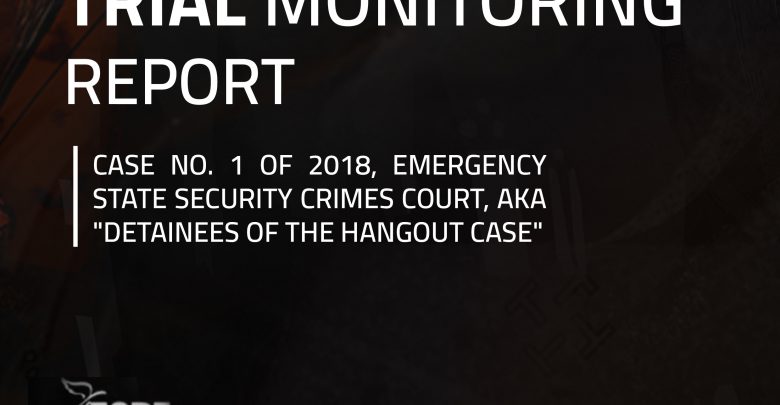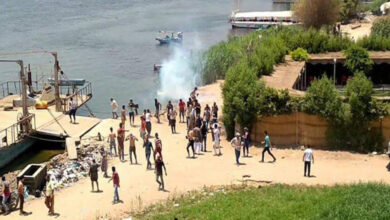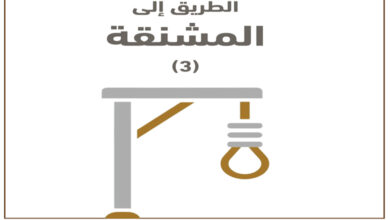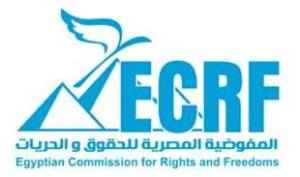Egyptian Commission for Rights and Freedoms (ECRF) demands the annulment of the sentence issued by an emergency court against the “Hangout Detainees”
Following the renewal of the state of emergency

ECRF issued today its first report on the monitoring of trials of case No. 1 of 2018, Darb Ahmar State security offenses, known at the media by the “Hangout Detainees”, in which both Inas Mohammed Hussein and Mohamed Mahfouz Abdel Latif were sentenced to two years’ imprisonment, after a trial that had not met their rights to a fair trial. ECRF also demands the President of the Republic to use his powers to cancel the sentence and release them.
The report documented how the State Security Emergency Court had returned to conduct its work in the event of the state of emergency that had been applied throughout the Arab Republic of Egypt since April 2017. This report documents violations of the right to a fair trial, which occurred, beginning from the arrest and during the various stages of the trial for the “Hangout Detainees”
This is what ECRF found through its monitoring of the trial as a contradiction to the legal and human rights standards provided based on both the Egyptian law and international human rights law, in regard to fair and equitable trial standards.
The violations began with the arrest of the five suspects – Three of whom were later released –, fabrication of the case of flagrant delicto, them being taken to an unknown place, subjected to ill-treatment, their detention in reserve without justification, medical negligence, deprivation of being examined by a competent doctor, rejecting the requests of the defense team since their investigation into the prosecution until the trial, till ending the long list of violations with the court amending the sentence against the defendants, without the presence of the defense team during this amendment other, in a clear violation of the law.
The report also discussed the right of detainees to have their cases heard by a fully independent court without any intervention from the executive authority in its judgments, in accordance with Article 184 of the Egyptian Constitution, which states:
The judiciary is independent. It is vested in the courts of justice of different types and degrees, which issue their judgments in accordance with the law. Its powers are defined by law. Interference in judicial affairs or in proceedings is a crime to which no statute of limitations may be applied.
And the right of detainees in litigation on two levels, as stipulated in Egyptian law, which is a principle that has been violated in this trial, since it is a general constitutional and human rights principle, as Article 14 states the International Covenant on Civil and Political Rights, a Principle 21 of the Bangalore Principles, which state that:
It is the duty of the competent authorities to ensure lawyers access to appropriate information, files and documents in their possession or control in sufficient time to enable lawyers to provide effective legal assistance to their clients. Such access should be provided at the earliest appropriate time.
On the other side, ECRF has faced some of the challenges faced by the defense team, most notably the lack of access and approval of making photocopies of the case files and documents, and not being able to express their defenses within reasonable time limits, which violated the guarantees of a fair trial set out in principle 21 of the Basic Principles on the Role of Lawyers (the Bangalore Principles), and also contradicts with the Egyptian Code of Criminal Procedure in article 84, that states:
“The defendant, the victim, civil rights plaintiff and responsible for civil rights may, during the investigation, request the issuance of copies of any type of document at the personal expense thereof, unless the investigation is conducted in the absence thereof based on a relevant decision”
This report also discusses the dilemma of using Article 102 bis, of the Egyptian Penal Code, as a tool to suppress freedom of opinion and expression, which is contrary to article 19 of the International Covenant on Civil and Political Rights, which states that:
The report concluded with recommendations which included:
- The cancellation by the President of the Republic of the sentence in the case because it was the result of a breach of Egypt’s international obligations and the Constitution and the Egyptian law, in regard to the right to a fair trial.
- The immediate and unconditional release of the prisoners in this case, as it was the result of police suspicion of their exercise of the right to freedom of opinion and expression, and because it was the result of actions contrary to the Code of Criminal Procedure; from the moment of arrest to refusing to inform them of the arrest and its reasons, and taking to an unknown place until their presentation to the prosecution.
- An amendment to Article 102 bis of the Penal Code which punishes by imprisonment for the dissemination of false news that would harm the public security, for violating the text of the Egyptian Constitution and international treaties and conventions, as this article is used in the suppression of freedom of opinion and expression and all articles restricting this right.
- Suspension of Emergency Law No. 162 of 1958, which has been in effect since the declaration of the state of emergency throughout the country, since April 2017, which has been renewed every three months since then, by manipulating article 154 of the Constitution, which states:
“In all cases, the declaration of a state of emergency must be approved by a majority of members of the House of Representatives. The declaration is for a specified period not exceeding three months, which can only be extended by another similar period upon the approval of two-thirds of House members.”





